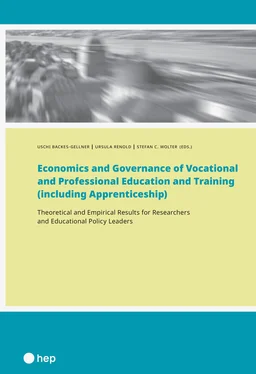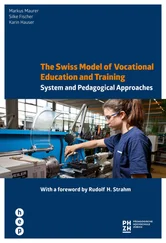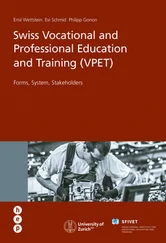Backes-Gellner, U., & Pfister, C. (2019). The contribution of Vocational Education and Training to innovation – The case of Switzerland . Bern: SERI. doi:10.5167/uzh-183335
Backes-Gellner, U., Rupietta, C., & Tuor Sartore S. N. (2017). Reverse educational spillovers at the firm level. Evidence-based HRM, 5 (1), 80–106. doi:10.1108/ebhrm-03-2015-0007
Balestra, S., & Backes-Gellner, U. (2017). Heterogeneous returns to education over the wage distribution: Who profits the most? Labour Economics, 44 , 89–105. doi:10.1016/j.labeco.2017.01.001
Becker, G. S. (1962). Investment in human capital: A theoretical analysis. Journal of Political Economy, 70 (5), 9–49. doi:10.1086/258724
Becker, G. S. (1964). Human capital: A theoretical and empirical analysis, with special reference to education . New York: National Bureau of Economic Research.
Bertschy, K., Cattaneo, M. A., & Wolter, S. C. (2009). PISA and the transition into the labour market. LABOUR, 23 ,111–137. doi:10.1111/j.1467- 9914.2008.00432.x
Bolli, T., Caves, K. M., Renold, U., & Buergi, J. (2018). Beyond employer engagement: Measuring education-employment linkage in Vocational Education and Training programmes. Journal of Vocational Education and Training, 70 (4), 524–563. doi:10.1080/13636820.2018.1451911
Bolli, T., Kemper, J., Parajuli, M. N., Renold, U., & Thapa, B. (2019). First report on the new dual VET-apprenticeship programme in Nepal: Formative assessment of the first cohort. KOF Studies No. 135. doi:10.3929/ethz-b-000345486
Bolli, T., Renold, U., & Woerter, M. (2018). Vertical educational diversity and innovation performance. Economics of Innovation and New Technology, 27 (2), 107–131. doi:10.1080/10438599.2017.1314075
Caves, K. M., & Baumann, S. (2018). Getting there from here: A literature review of VET reform implementation. KOF Working Papers No. 441. doi:10.3929/ethz-b-000257741
Dionisius, R., Muehlemann, S., Pfeifer, H., Walden, G., Wenzelmann, F., & Wolter, S. C. (2009). Costs and benefits of apprenticeship training: A comparison of Germany and Switzerland. Applied Economics Quarterly, 55 (1), 7–37. doi:10.3790/aeq.55.1.7
Eggenberger, C., & Backes-Gellner, U. (2020). IT skills, occupation specificity and job separations. Swiss Leading House Working Paper No. 172.
Eggenberger, C., Rinawi, M., & Backes-Gellner, U. (2018). Occupational specificity: A new measurement based on training curricula and its effect on labor market outcomes. Labour Economics, 51 , 97–107. doi:10.1016/j.labeco.2017.11.010
Geel, R., & Backes-Gellner, U. (2011). Occupational mobility within and between skill clusters: An empirical analysis based on the skill-weights approach. Empirical Research in Vocational Education and Training, 3 (1), 21–38.
Geel, R., Mure, J., & Backes-Gellner, U. (2011). Specificity of occupational training and occupational mobility: An empirical study based on Lazear’s skill-weights approach. Education Economics, 19 (5), 519–535. doi:10.1080/09645291003726483
Greinert, W.-D. (1988). Marktmodell – Schulmodell – duales System. Grundtypen formalisierter Berufsbildung. Die berufsbildende Schule, 40 (3), 145–156.
Harhoff, D., & Kane, T. J. (1997). Is the German apprenticeship system a panacea for the U.S. labor market? Journal of Population Economics, 10 (2), 171–196. doi:10.1007/s001480050037
Lauterbach, U. (1995). Typen-, Kategorien- und Modellbildung von Systemen beruflicher Bildung. In Lauterbach, U. (Ed.), Internationales Handbuch der Berufsbildung (pp. 103–122), Baden-Baden: Nomos.
Mohrenweiser, J., Zwick, T., & Backes-Gellner, U. (2019). Poaching and firm-sponsored training. British Journal of Industrial Relations, 57 (1), 143–181. doi:10.1111/bjir.12305
Muehlemann, S., Pfeifer, H., Walden, G., Wenzelmann, F., & Wolter, S. C. (2010). The financing of apprenticeship training in the light of labor market regulations. Labour Economics, 17 (5), 799–809. doi:10.1016/j.labeco.2010.04.006
Muehlemann, S., Wolter, S. C., & Joho, E. (2018). Apprenticeship training in Italy – A cost-effective model for firms? Guetersloh: Bertelsmann Stiftung.
Mueller, B., & Wolter, S. C. (2014). The role of hard-to-obtain information on ability for the school-to-work transition. Empirical Economics, 46 (4), 1447–1471. doi:10.1007/s00181-013-0709-2
Oswald, Y., & Backes-Gellner, U. (2014). Learning for a bonus: How financial incentives interact with preferences. Journal of Public Economics, 118 , 52–61. doi:10.1016/j.jpubeco.2014.06.003
Rageth, L., & Renold, U. (2019). The linkage between the education and employment systems: Ideal types of vocational education and training programs. Journal of Education Policy, 27 , 1–26. doi:10.1080/02680939.2019.1605541
Renold, U., Bolli, T., Buergi, J., Caves, K. M., Oswald-Egg, M. E., Kemper J. M., & Rageth, L. (2016). Feasibility study for a curriculum comparison in Vocational Education and Training, Intermediary report II: Education-employment-linkage index. KOF Studies No. 80. doi:10.3929/ethz-a-010696087
Renold, U., Caves, K. M., Maldonado-Mariscal, K., Oswald-Egg, M. E., Markovic, J., Veselinovic, Z. & Todorovic, M. (2019). Implementation of the Serbian law on dual education. First report on drivers and barriers in the pre-implementation phase. KOF Studies No. 129. doi:10.3929/ethz-b-000337794
Rinawi, M., & Backes-Gellner, U. (2020). Firms’ method of pay and the retention of apprentices. Oxford Economic Papers, 72( 1). 262–291.doi:10.1093/oep/gpy074
Rupietta, C., & Backes-Gellner, U. (2019). How firms’ participation in apprenticeship training fosters knowledge diffusion and innovation. Journal of Business Economics, 89 (5), 569–597. doi:10.1007/s11573-018-0924-6
Ryan, P. (2000). The institutional requirements of apprenticeship: Evidence from smaller EU countries. International Journal of Training and Development, 4 (1), 42–65. doi:10.1111/1468-2419.00095
Sadowski, D. (1980). Berufliche Bildung und betriebliches Bildungsbudget: Zur oekonomischen Theorie der Personalbeschaffungs- und Bildungsplanung im Unternehmen . Stuttgart: Poeschel.
Tuor, S. N., & Backes-Gellner, U. (2010). Risk-return trade-offs to different educational paths: Vocational, academic and mixed. International Journal of Manpower, 31 (5), 495–519. doi:10.1108/01437721011066335
Wolter, S. C., & Joho, E. (2018). Apprenticeship training in England – A cost-effective model for firms? Guetersloh: Bertelsmann Stiftung. doi:10.11586/2018008
Wolter, S. C., & Muehlemann, S. (2015). Apprenticeship training in Spain – A cost-effective model for firms? Guetersloh: Bertelsmann Stiftung. doi:10.11586/2016011
Wolter, S. C., Muehlemann, S., & Schweri, J. (2006). Why some firms train apprentices and many others do not. German Economic Review, 7 (3), 249–264. doi:10.1111/j.1468-0475.2006.00155.x
Chapter 2: Socially Constructed Concepts—Methodological Problems in Comparing VET Programs
Ursula Renold
Socially constructed concepts are part of social systems. Identifying and understanding such concepts is a necessary prerequisite to internationally comparing education and training systems. By highlighting where socioeconomic and sociocultural differences may be rooted and shedding light on aspects of political economy theory, this chapter describes methodological problems in comparing VET programs. Starting with issues related to the definitions of such programs and continuing with a simple classification scheme to overcome problems of definitions, I summarize relevant forms of construction metaphors to understand different types of social constructs in the literature.
Читать дальше












